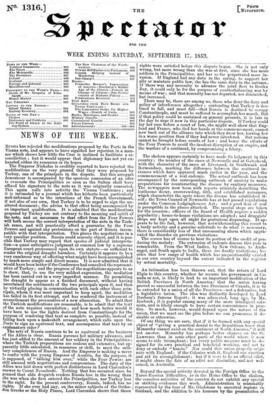NEWS OF THE WEEK.
Russu has rejected the modifications proposed by the Porte in the Vienna note, and appears to have signified her rejection in a man- ner which shows how little the Czar is inclined to facilitate a re- conciliation ; but it would appear that diplomacy has not yet ex- hausted either its resources or its hopes.
The Emperor Nicholas is credibly reported to have rejected the modifications on the very ground that they were proposed by Turkey, one of the principals in the dispute. But this arrogant demeanour is accompanied by the specious concession of an offer to evacuate the Principalities so soon as the Sultan shall have affixed his signature to the note as it was originally concocted. This again calls into activity the Vienna Conference ; and it is intimated by a journal which has hitherto been particularly well-informed as to the intentions of the French Government, if not also of our own, that Turkey is to be urged to sign the un- altered document ; the advice to that effect being accompanied by an important qualification. It is admitted that the modifications proposed by Turkey are not contrary to the meaning and spirit of the note, and an assurance to that effect from the Four Powers will both secure the correct interpretation of the note in the Turk- ish sense, and will practically afford a guarantee by the Four Powers and against any pretensions on the part of Russia incom- patible with that interpretation. This places the negotiations in a very peculiar position. Russia could scarcely object, and it is pos- sible that Turkey may regard that species of judicial interpreta- tion—a quasi anticipative judgment at common law by a supreme European court pronounced upon its own statute—as sufficient to render the original draught harmless. Certainly it appears to be a very cumbrous way of effecting what might have been accomplished by much more simple and direct means. It is now admitted that it would have been better if the Conference had consulted the represent- ative of Turkey ; and the progress of the negotiations appears to us to show, that, to use the very mildest expression, the mediation has been carried out in a very imperfect manner. By permitting the draught to appear as a finished document, without having ascertained the sentiments of the two principals upon it, and then by virtually placing in communication with each other those prin- cipals, whom it was most important to keep apart, the mediation has failed in its first attempt, and has rendered the instrument of reconcilement the provocative of a new altercation. To admit that the Turkish modifications are reasonable, is to admit that the text of the note requires emendation ; and how much better would it have been to use the lights derived from Constantinople for the purpose of rendering that text as complete as possible, instead of telling back upon a makeshift arrangement, which mills upon the Porte to sign an equivocal text, and accompanies that text by an explanatory rider ?
The acts of Russia continue to be as equivocal as the business of the Allies is clear. Russia pursues her military advances, and has just added to the amount of her soldiery in the Principalities ; where the Turkish preparations are zealous and extensive, but ap- parently little calculated, in resources or skill, to meet the mili- tary completeness of Russia. And the Emperor is making a move to confer with the young Emperor of Austria, for the purpose, it is supposed, of "talking him over," while the Four Powers are still amused with negotiations and compromises. The duty of the Allies was laid down with perfect distinctness in Lord Clarendon's answer to Count Nesselrode. Nothing that has occurred since he penned that able despatch renders Russia less in the wrong than she was when she first entered the Principalities, nor Turkey less in the right. In the present controversy, Russia, indeed, has no rights. If she ever had any, on the minor subjects of the Ortho- dox Greeks or the Holy Places, Lord Clarendon shows that those
rights were satisfied before this dispute began. She is not only wrong, but more wrong than she was at first, since she has more soldiers in the Principalities, and has so far perpetrated more in- vasion. If England had any duty in the spring, to support her ally or maintain public law, she has the same duty in the autumn. If there was any necessity to advance the joint fleet to Besika Bay, it could only be for the purpose of counterbalancing war by means of war ; and that necessity has not departed, nor diminished, but increased.
There may be, there are among us, those who deny the duty and policy of interference altogether ; contending that Turkey is des- tined to fall, and must fall—that Russia is destined to occupy Constantinople, and must be suffered to accomplish her march. But if that policy could be sustained on general grounds, it is late in the day to urge it now in this particular dispute. If Turkey could lay her ease before a court of law, she might well show that Eng- land and France, who tied her hands at the commencement, cannot now back out of the alliance into which they drew her, leaving her in a worse position than if they had never interfered. But nations cannot be brought before courts of law ; and hence the efforts of the Four Powers to avoid the insolent disruption of an empire, and the warfare of a continent, by compromising a felony.


























